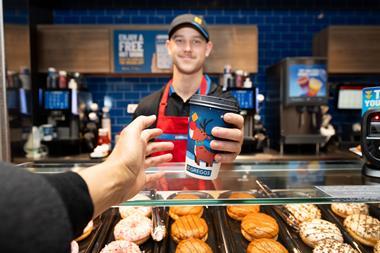Haydens and Renshaw owner Real Good Food has secured further funding after announcing a loss of almost £7m in the first half of 2017.
While the company’s revenue rose 30% year on year to £63.6m in the six months ending 30 September 2017, it made a £6.7m pre-tax loss compared with a £0.9m loss in the same period the previous year. Turnover rose 13.2% excluding the impact of the Brighter Foods business, acquired last April.
The preliminary results follow a troubled period for the business that has included a shake-up of its board and an overhaul of its corporate governance procedures. In October, it reported a £5.8m loss in the 12 months ending 31 March 2017.
The difficulties prompted a re-forecasting exercise, with the business consequently securing a £2m overdraft facility with Lloyds Bank, and a £4m short-term debt facility from shareholders.
Two weeks ago (22 December), the board announced “further substantial additional funding” would be required over the coming 12 months for working capital and investment.
As a result, RGF’s three major shareholders – NB Ingredients Ltd, Omnicane International Investors Ltd, and funds managed by Downing LLP – have agreed to provide an initial £3m of additional funds while longer-term funding arrangements are put in place. The board said it had considered other forms of funding, but these would take too long to arrange for its short-term requirements.
“This has been an extremely difficult period for the company,” said RGF interim chairman Pat Ridgwell. “The acquisition of Brighter Foods and investments in new capacity and greater efficiency at Renshaw and Haydens were pursued in advance of suitable financing arrangements being completed, leading to cash shortages and delays in the implementation of these projects.”
Ridgwell added that previous “serious failings” in corporate governance had required “significant resources and costs” to rectify.
“Although we saw a strong sales performance across all divisions, profits were significantly below last year as a result of increased costs associated principally with the delays in the major investment projects, but also the need to react swiftly and professionally to provide the group with an adequate corporate governance structure.
“A series of new lending arrangements to secure the business has been put in place by the group’s major shareholders, who have again stated and demonstrated their full, continuing support for the business.”
Ridgwell added that, as previously announced, EBITDA for the 2018 financial year would be below previous expectations.
“We expect EBITDA for 2018 as a whole to be in the region of break-even, with a consequential overall loss before tax,” he added. “We have implemented overhead and other cost savings initiatives and are developing plans to ensure revenue growth starts to translate into increased profits and shareholder value.”
The business also announced that executive director Christopher Thomas had become non-executive deputy chairman, with current non-executive director Hugh Cawley becoming executive director.
RGF divisional performance
Real Good Food is divided into three divisions: Cake Decoration including Renshaw and Rainbow Dust Colours; Food Ingredients including the Brighter Foods snack bar business acquired this year, Garrett Ingredients and R&W Scott; and Premium Bakery including Haydens and Chantilly Patisserie.
Cake Decoration
- Revenue: £22.5m (+1.4m YOY)
- EBITDA prior to significant items: £1.3m (-£1.8m YOY)
Sales rose 6.8% year-on-year with growth in America and Europe, although margins were hit by commodity price increases and currency impact. Delays to implementation of investments in an automated icing disc line and frostings capacity caused cost overruns and constrained sales. A relaunch of the Rainbow Dust brand is planned at the start of the 2019 financial year.
Food Ingredients
- Revenue: £24.0m (+11.7m)
- EBITDA prior to significant items: £0.9m (+1.4m)
Volume and revenue grew at Garrett Ingredients as dairy prices increased. R&W Scott’s sales were in line with the previous year, although the business suffered operational difficulties that impacted margins. The acquisition of Brighter Foods contributed to revenue and EBITDA growth.
Premium Bakery
- Revenue: £17.2m (+1.6m)
- EBITDA prior to significant items: -£0.2m (-£0.8m)
Revenue grew 10% year on year, although EBITDA was hit by operational costs as the business adapted to a new product mix and production was reconfigured. The increase in the price of butter hit margins. A new, automated yum yum line went operational in September, and the business is increasingly focusing on three main categories: tarts, Danish and croissants, and yum yums. The division gained two major new retail customers from the third quarter.
































No comments yet